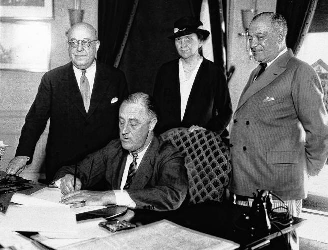
|
| President Franklin D. Roosevelt signs the Wagner-Peyser unemployment bill on June 6, 1933, at the White House. Standing (left to right) are Rep. Theodore A. Peyser of New York, Secretary of Labor Frances Perkins and Sen. Robert Wagner of New York. AP file |
|
http://www.concordmonitor.com/Fighting-for-better-workplaces-for-all-12201270
By SUSI NORD
For the Monitor
Saturday, September 02, 2017
Labor Day is a great time to think about the 21st-century workforce and how trends in the workplace affect the 669,000 of us who work in New Hampshire for our living.
Conditions in the workplace touch the lives of all Americans through our interactions with workers, such as teachers, doctors, the store clerk or the bus driver, or more directly through our families’ dependence on paid employment to make ends meet.
Wages in the pocket of working people are spent in local businesses and drive the local economy. In its Universal Declaration of Human Rights, the U.N. recognized that all people have a human right to engage in productive employment, and may not be prevented from doing so.
Conditions for working people are a basic foundation of society and interact intimately with other foundations, such as family, public life, and health and well-being.
In all of these areas, 21st-century working conditions are failing us: People are working longer hours for less money, and income inequality is rising. Working people have less time to spend with their children, volunteer at their churches or take care of their own health. The minimum wage is insufficient for meeting a family’s bare necessities while corporate profits are skyrocketing.
None of these conditions contribute to a healthy society; in fact, they lead to its exact opposite. Is it a coincidence that in 2015, the average life span for white blue-collar workers went down for the first time in decades?
A major contribution to the erosion of conditions for workers is that long-standing laws that protect workers have been under attack for more than two decades.
The Fair Labor Standards Act introduced the 40-hour work week, established the minimum wage and prohibited child labor. This year, H.R. 1180 was introduced to amend the FLSA to allow employers to offer comp time instead of paying workers overtime.
The Occupational Safety and Health Act was enacted to ensure “every working man and woman in the nation safe and healthful working conditions.” Right now it would take OSHA 129 years to inspect every work site in its jurisdiction, but in July Congress cut $13.5 million from OSHA’s enforcement budget while adding money to its voluntary programs for employers.
The National Labor Relations Act guarantees workers the right to form unions, bargain with their employers and strike if necessary. However, the most recent appointees to the board that oversees the NLRA are not people who have represented workers but are instead former corporate lobbyists. Time and again we are seeing laws that are intended to protect working men and women weakened in order to give more resources to corporate interests.
Labor Day is a celebration of workers’ contributions to society. According to the Bureau of Labor Statistics, 11 percent of New Hampshire’s workers are represented by labor unions. Unions give workers a measure of stability in the workplace. Together employees negotiate the terms of their employment, giving them the security of knowing that there are specific processes for handling work-related grievances, and a path to solving problems. Employees with health and safety concerns or wage and hour concerns have recourse through their unions, and employer retaliation is more difficult when an employee belongs to a union. Even non-union employees benefit from the negotiations of collective bargaining through written policies and procedures, which generally apply to everyone in a company and higher standards of living for all working people. Unions help women and minorities close the wage gap with their white, male peers and unions give their members a voice in public policy to support issues that affect all of us.
Workers’ unions led the call for programs such as Social Security, Workers’ Compensation, Unemployment Insurance and affordable health care for all Americans. These policies and programs are not only good for union members, they are good for society.
For those of us concerned about the 21st-century workforce, protecting workers’ rights to join a union and negotiate for fair pay and safe jobs is fundamental to improving conditions in the workplace for all of us.
(Susi Nord works for the New Hampshire Coalition for Occupational Safety and Health.)
|


